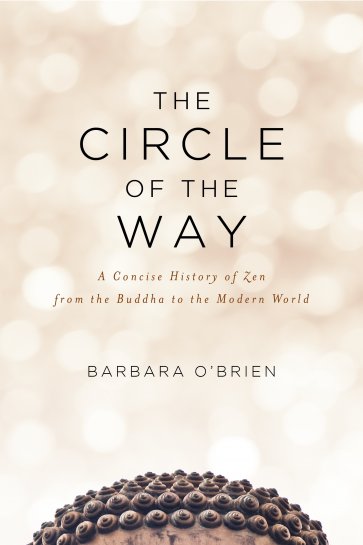A Unique and Valuable Book for New and Old Zennies: The Circle of the Way - A Concise History of Zen from the Buddha to the Modern World
This book fills a very important niche, and I would like to encourage all Zen folks, the rather new or very experienced, to read it. For people new to Zen and wanting to know about its history and origins in India, China and Japan, the book provides an extremely well-researched yet easy to read, reasonably short but amazingly comprehensive, serious in content while very often fun and funny, wide ranging introduction to Zen's roots and development right down to modern times and Zen's coming west. It is a serious history book, yet not a heavy read.
However, even for long time Zen practitioners, the book is chock full of fascinating information, perspectives and summaries of the latest research on our history and practices, and even someone who has read 1000 Zen books and sat Zazen for decades will learn quite a bit I feel. (I did.) The author, whom I consider to be one of the most reliable sources of information about Zen and other Buddhist traditions through her many blogs, feature writings and articles (someone whom I have read for many years via a variety of Buddhist websites and magazines) really knows her Zen stuff.
The book is also quite unique in presenting the Soto Zen Buddhist approach to practice quite fairly and accurately, and side-by-side with its presentation of Rinzai Zen ways and other flavors of our traditions, showing the commonality and contrast. She also knows the face of Zen that transcends all differences and time. Perhaps none of the books of prior generations, such as the two volume "A History of Zen Buddhism" by Father Dumoulin, the works of D.T. Suzuki and the like, managed this quite as well. Also, those books are now quite out of date and rather parochial in scope, while this new volume presents the results of current scholarship and a more objective and factual understanding of Zen's roots. It is unique in being quite honest (unlike those other histories which often lacked the latest information, and could be a bit romantic in their style) in presenting a candid and open take on our history which seeks to separate fact from fiction or myth, historical event from mere legend or doubtful claim, discussing both light and shadows. She is also honest about gaps in our knowledge and the questions about which people disagree. It is refreshing. Nonetheless, the author, Barbara Hoetsu O'Brien, is a long time practitioner herself, and thoroughly honors and cherishes our ways, holding them in the greatest reverence. She has been around the Buddhist block. Thus, Barbara somehow succeeds in presenting a modern and honest take on Zen's past while celebrating and loving the beauty of this Way.
I highly recommend this book to all without reservations, and I hope everyone will read it soon.
Gassho, Jundo
STLah

This book fills a very important niche, and I would like to encourage all Zen folks, the rather new or very experienced, to read it. For people new to Zen and wanting to know about its history and origins in India, China and Japan, the book provides an extremely well-researched yet easy to read, reasonably short but amazingly comprehensive, serious in content while very often fun and funny, wide ranging introduction to Zen's roots and development right down to modern times and Zen's coming west. It is a serious history book, yet not a heavy read.
However, even for long time Zen practitioners, the book is chock full of fascinating information, perspectives and summaries of the latest research on our history and practices, and even someone who has read 1000 Zen books and sat Zazen for decades will learn quite a bit I feel. (I did.) The author, whom I consider to be one of the most reliable sources of information about Zen and other Buddhist traditions through her many blogs, feature writings and articles (someone whom I have read for many years via a variety of Buddhist websites and magazines) really knows her Zen stuff.
The book is also quite unique in presenting the Soto Zen Buddhist approach to practice quite fairly and accurately, and side-by-side with its presentation of Rinzai Zen ways and other flavors of our traditions, showing the commonality and contrast. She also knows the face of Zen that transcends all differences and time. Perhaps none of the books of prior generations, such as the two volume "A History of Zen Buddhism" by Father Dumoulin, the works of D.T. Suzuki and the like, managed this quite as well. Also, those books are now quite out of date and rather parochial in scope, while this new volume presents the results of current scholarship and a more objective and factual understanding of Zen's roots. It is unique in being quite honest (unlike those other histories which often lacked the latest information, and could be a bit romantic in their style) in presenting a candid and open take on our history which seeks to separate fact from fiction or myth, historical event from mere legend or doubtful claim, discussing both light and shadows. She is also honest about gaps in our knowledge and the questions about which people disagree. It is refreshing. Nonetheless, the author, Barbara Hoetsu O'Brien, is a long time practitioner herself, and thoroughly honors and cherishes our ways, holding them in the greatest reverence. She has been around the Buddhist block. Thus, Barbara somehow succeeds in presenting a modern and honest take on Zen's past while celebrating and loving the beauty of this Way.
I highly recommend this book to all without reservations, and I hope everyone will read it soon.
Gassho, Jundo
STLah










Comment